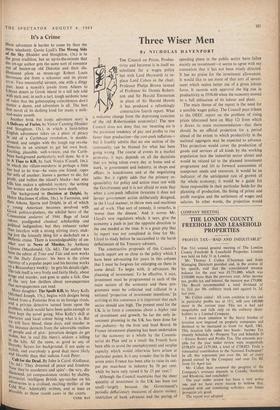It's a Crime
HMI] adventure is harder to come by than the mere whodunit: Gavin Lyall's The Wrong Side 01 the Sky (Hodder and Stoughton, 15s.) is in the great tradition, but so up-to-the-minute that the jet-age author gets the same sort of romance out of beaten-up old Dakotas and their dis- illusioned pilots as steam-age Robert Louis Stevenson did from a schooner and its pirate crew. Two resourceful airmen, one with a dingy Past, hunt a nawab's jewels from Athens to Libyan desert to Greek island in a tall tale told With such zest, in such a tart, tough sardonic tone of voice that the gobstopping coincidences don't matter a damn, and adventure is all. The best first novel of its dashing kind for many a milk- and-water month.
Another brisk but ironic adventure story is A Delivery of Furies, by Victor Canning (Hodder and Stoughton, I5s.), in which a hard-bitten English adventurer takes on a piece of piracy in aid of a Caribbean revolution, is double- crossed, and tangles with the tough top revolu- tionaries in an attempt to get his own back. Exciting, plausible, well-m'itten, and the Carib- bean background particularly well done. So it is in A Time to Kill, by Jack Weeks (Cassell, 16s.). in which the villain-murderec is perhaps a little too bad to be true—he ruins one friend: rapes the wife of another; leaves a partner to die, for Profit; and bullies the island's blacks—but who kills him makes a splendid mystery: the writing has texture and the characters have depth. • The background in Decision at Delphi, by Helen Maclnnes (Collins, 18s.), is Taormina, and then Athens, Sparta and Delphi, in all of which a young American becomes involved with Greek politico-plotters, the nihilist heirs of the Communist andartes of 1944. Bags of local colour, predigested classical scholarship and Political indignation, but they enhance rather Pan interfere with a strong stirring story, mak- ing just the leisurely thing for a deckchair on a Hellenic cruise. There is knowiledgeability of an- other sort in News of Murder, by Anthony Leieune (Macdonald, 12s. 6d.). The author has been the editor of Time and Tide and now works on the Daily Express: his hero is the crime reporter of a popular paper and his heroine works „°n a Bloomsbury weekly: he gets his details right. file tale itself is very lively and fairly likely, about drugs and murder, and goes at quite a lick. One of the very few thrillers about newspapermen that newspapermen can read. More slaughter. The Spoilt Kill, by Mary Kelly (Michael Joseph, 15s.), begins with designs being leaked from a Potteries firm to its foreign rivals, and a private detective turned loose upon the problem, which would have been quite enough to have kept the novel going, Miss Kelly's skill at character and local colour being what it is. But We Will have blood, these days, and murder in this instance detracts from the admirable realism of people and of plot : porcelain designs do get Stolen, but in real life there's seldom a killing 111 the kiln. All the same, as good as any of boilthySayers for background, if not quite so sh, and everybody a good deal more likely and likeable than that tedious Lord Peter. Call for the Dead. By John le Carre. (Gollancz, 6d.) 'They dreamed of peace and freedom. 14.avv they're murderers and spies'—the wry, dis- illusioned, yet compassionate verdict by shabby, rovincial, intelligent British spy-catcher on his Cold in a civilised, exciting thriller of the _‘-,old War. Admirably written, and at least as Plausible as those recent cases in the courts.
CYRIL RAY


































 Previous page
Previous page